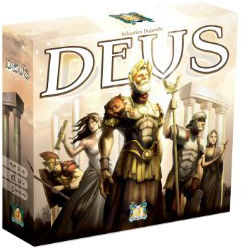



play board games
Board game reviews, strategy tips & session reports
Deus Board Game Review
 Stats:
Stats:
No. of players: 2-4
Amount of time to play: 60-90 min
Age requirements: 10+
Set-up time: 5 minutes
Deus is a tableau building card game. You must manage your resources to build your civilization and score the most VPs.
Deus Rules Description:
You start Deus with one of four different resources, five gold, five VPs, two of five building types and a hand of five cards.
On your turn you either construct a building in your hand or make an offering to a god. When you choose the building option, you must pay for that building in resources. If you want you can substitute gold for resources at a four to one ratio. Then you take a building from your player board and place it on the board adjacent to a previously placed building. You can even building the same space but can never have more than one of a building type in a space. For your first placement you must start on the edge of the board at least two places from another player’s building. Each building lets you take an action, like gaining or selling resources, scoring VPs or moving armies. When you add a new building card to your tableau you execute each previously built building’s action.
To make an offering to a god you discard cards. The more cards you discard the more substantial the reward (usually). The only card that matters is the top card. That is the god you are making your offering to and triggering its special ability. The special abilities include gaining 2 gold per card discarded, one resource per card discarded, one extra card after redraw per card discarded, one VP for one card discarded two VP if you discard two or more, or one building of any type from your supply to your player board. You also gain a building of that cards type on your player board and redraw up to five cards when making an offering.
The sixth building type is a temple. There are a different number of temples in the game based on the number of players. They provide end game scoring. But in order to build more than one you must have a set of all the other buildings constructed. So in order to build a third temple you must have two full sets of the other buildings constructed.
The board is a different size based on the number of players and has barbarian villages on it. Each barbarian village contains three to six VPs in it based on the number of hexes that surround it. These VPs may be captured once one or more player’s buildings surround the barbarian village. The player with the most army units surrounding the barbarian village gets the VPs. Tied players spilt the VPs rounding down.
Once all the temples have been built or all the barbarian villages are empty of VPs you play a final turn and the game ends. You gain VPs based on your temples and 2 VPs for having the most of a resource including gold. The player with the most total VPs wins. The tiebreaker is having the most buildings in your tableau.
Quick Review of Deus:
Deus is a fun game that offers various paths to victory. You must make the most of the cards you are dealt. And managing your hand is important. Teaching this game is pretty easy too.
The components in this game are a mixed bag. The art on the cards is nice, but the map spaces are just ok. The tokens and chits are decent and the cards are durable. The biggest annoyance is that the wood pieces are brown but referenced as green on the cards. It is not game breaking but can be confusing, especially for new players. The rules are well written and easy to follow too.
I like that you can spread out or hunker down and win either way. While cutting off players can be part of your strategy in Deus it is not very powerful. Army buildings can move and provide a new spot to build from. Or you can spend 3 VP to come in on another edge of the board. Sometimes if you get cut off you have cards that reward you for having more buildings in one space so it won’t matter.
Getting to trigger all your previously built building actions is great. By concentrating on a specific type of building you can stack some cool and powerful abilities. This is balanced by having to have sets to build more than one temple. But building your engine and watching it work is a lot of fun.
One thing some players are not too fond of is the lack of interaction in the game. It isn’t that there is no interaction but it is mostly limited to cutting people off. Others feel that that is enough for them.
Deus is a great next step game. Some might even consider it to be a gateway game. I think new and long-time gamers can both compete in and enjoy this game. If it sounds interesting to you pick it up.
Score and synopsis: (Click here for an explanation of these review categories.)
Strategy 4 out of 6
Luck 4 out of 6
Player Interaction 3 out of 6
Replay Value 5 out of 6
Complexity 3 out of 6
Fun 5 out of 6
Overall 5 out of 6

Leave a Reply